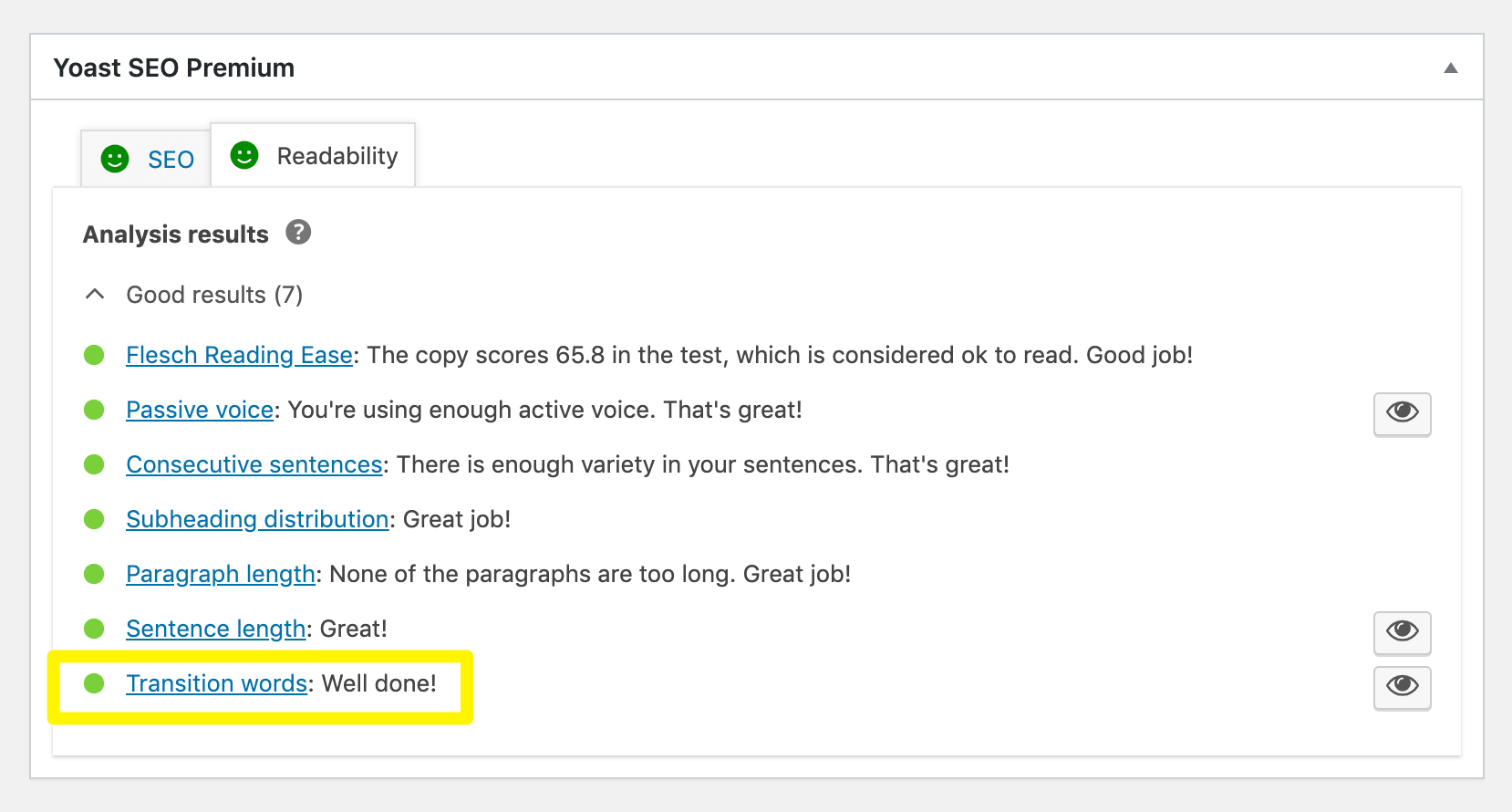Transition words are everywhere, even if you don’t notice them. Without them, language would be dry and robotic, with abrupt changes from one sentence to the next. To maximize the quality and readability of your web content, it’s essential for you to be aware of these linguistic elements and whether you’re using them to their full effect in your writing.
There are many different types of transition words and phrases you can use. In this article, we’ll break them down into ten categories and talk about the impact they have on readability and Search Engine Optimization (SEO).
Let’s jump in!
An Introduction to Transition Words
In short, a transition word or phrase is one that helps bridge two sentences, paragraphs, or sections of a piece together. They provide additional context that can help readers link information together to see the big picture. Additionally, they provide structure and organization to your text to make it easier to understand.
It’s almost impossible to overstate the importance of transition words when it comes to language. There are hundreds you can use, so it’s not an exaggeration to say there’s one for just about every occasion. Some popular examples include ‘therefore’, ‘for example’, ‘in addition’, ‘in short’, and many others.
In practice, it’s easy to see what a huge difference transition words make when it comes to readability. Here are a few examples to illustrate that fact:
- I’m not a fan of pasta. I do love lasagna. / I’m not a fan of pasta. However, I do love lasagna.
- Garlic goes well with everything. It really highlights the flavor of tomatoes. / Garlic goes well with everything. In particular, it really highlights the flavor of tomatoes.
- There are a lot of factors that contribute to success. Hard work is of utmost importance. / There are a lot of factors that contribute to success. Above all, hard work is of utmost importance.
- This list is getting very long. I’m going to wrap it up. / This list is getting very long. Therefore, I’m going to wrap it up.
In many cases, you can make your point without transition words. However, as the examples above show, language becomes more of a blunt instrument when you do so. Connecting your sentences helps them flow more naturally and sound more sophisticated, which can make your content more enjoyable to read.
Why Transition Words Are Important for SEO
There’s a definite link between transition words and SEO, although we wouldn’t go as far as to say there’s a direct correlation. In short, using transition words can improve your content’s structure and readability.
The more ‘readable’ your content is, the more engaging people are likely to find it. That means visitors may spend more time on your website, which is one of the metrics search engines take into consideration when determining rankings.
That link may sound tenuous, but the fact is, there’s no downside to making your content easier to read. It’s such an important element that many WordPress SEO plugins such as Yoast SEO include specific Readability scores:

Yoast, in particular, pays close attention to your use of transition words. If you want to get a ‘green light’, at least 30 percent of your sentences need to include transition words (as in the example above).
That doesn’t necessarily mean you should jam in transition words wherever you can. However, it is an invitation for you to pay closer attention to the way you use them and, if possible, to expand your vocabulary.
Most of us rely on a unique set of transition terms and phrases. We pick the ones we like without noticing it and then stick to those when we’re writing. It can be beneficial to your content to make an effort to mix up your word choice on occasion.
10 Types of Transition Words and How to Use Them to Improve Your Writing
Since there are so many transition words to choose from, it’d be extremely difficult to list them all in a single post. Instead, we’ve introduced ten different types of connecting terms and phrases you can use, with some key examples from each category.
If you’re concerned specifically with transition words for SEO and just want that Yoast green light, you can view the plugin’s transitionWords.js file for a complete list of terms that count toward the 30 percent minimum.
1. Addition
Addition transition words are one of the most common types in all of the English language. We use them to reinforce the points we’re trying to make or to expand upon them. Some of the most common examples include:
- Again
- Also
- Like
- In addition
- Not to mention
Terms such as ‘and’, ‘too’, and ‘as’ also fall into this category. Most people rely heavily on these more popular words. When you’re editing your work, consider doing a quick search for some of them and trying to use a few alternatives like ‘equally’ or ‘moreover’.
2. Cause and Effect
Every action has a reaction, and there’s a whole family of transition words dedicated to that duality. Some of them include:
- If
- Whenever
- Because of
- Due to
- So long as
This category of connecting words and phrases is useful in just about any type of blog post you might want to write. Chances are, you’ll want to explain the impact of some factor – such as a product you’re promoting – on readers’ lives to demonstrate the value of your content.
3. Clarification
Sometimes, the best way to make your point is through an example. Clarification transition words are all about helping you isolate specific items, situations, people, and more so you can better explain your reasoning. Terms that fall under this category include:
- For example
- Namely
- In other words
- In particular
- Such as
Illustrating a point through an example is one of the most straightforward ways to clarify your content. This is particularly true for complex subjects. Using analogies or specific case studies can help break down a higher-level idea or concept in a manner that is more digestible to readers.
4. Contrast
When you look out for it, conflict is everywhere, even in writing. Prime examples of it can be seen in contrast or opposition transition words, such as:
- But
- Although
- Instead
- Despite
- Besides
While their connotation might be negative, contrast transition words are a net positive. In reality, they help you highlight key differences between ideas and introduce topic shifts in your writing.
5. Similarity or Emphasis
On the opposite end of the spectrum, you have similarity or emphasis transition words. In short, they’re the type of words you use to connect ideas and phrases that are closely related. Examples include:
- Likewise
- In the same way
- As well as
- To say nothing of
- Especially
In many cases, similarity and addition transition words get bundled together. They’re both equally as important when it comes to readability. Frequently, you may see terms from both categories in the same sentence.
6. Enumeration
Enumeration transition words encompass all those phrases that make reference to a chronological sequence. Some notable examples include:
- First of all
- Secondly
- Finally
- To begin with
- Lastly
Enumeration transition words tend to do their best work at the beginning of a sentence and can help you impart a hierarchy of importance within your content. They’re also valuable for writing tutorials or other types of posts in which sequence is key.
7. Time
Travel bloggers, lifestyle writers, and storytellers of all stripes will understand the value of this category. Time transition words are essential when trying to relay a series of events that have taken place or will happen in the future. There are plenty of quality options to pick from:
- Afterward
- Formerly
- Meanwhile
- At the same time
- Eventually
It’s important to mention that there’s a lot of overlap between time and enumeration transition words, owing to their similar nature. However, there are slight differences that can make one option more ideal than the other under certain circumstances.
8. Space
This may seem like an odd category to include, but references to space are surprisingly common in many types of writing. In practice, that means you have a broad range of relevant transition words you can draw from, including:
- Here
- There
- Where
- Before
- Across
Whether your writing requires you to describe physical spaces or you simply need to instruct readers on where to add a line of code to their sites, space transition words are vital to clarifying information.
9. Details
There is a specific set of terms we often use to double down on a point or an idea. These are what we call ‘detail’ transition words. The following are some popular ones that come to mind:
- In particular
- To explain
- Specifically
- Namely
- Including
Whenever you want to emphasize a point, you’ll likely find yourself turning to detail transitions. They’re a handy tool to explain the specifics of a particular idea. Our “Garlic goes well with everything” example from earlier in this post shows this concept in action.
10. Summary
It’s often a wise idea to offer readers a recap of all the important points you’ve made throughout your post. When you need to do so, summary transitions are your best ally. Here are a few examples:
- Therefore
- Finally
- In short
- As a result
- In conclusion
These can also be helpful if you want to cover a concept quickly and concisely, even in the middle of an article. If you look back to the beginning of this post, you’ll see we used “In short” to introduce our initial definition of transition words.
Conclusion
There are literally dozens of transition words in the article you just read, even without counting the lists of examples. These small elements of language are essential if you want to create content that makes it easy for readers to follow along.
There’s a significant amount of overlap when it comes to different types of transition words. If you’re not sure which one to use, it all comes down to context. The more of them you feel comfortable using, the better your writing – and possibly even your SEO – should become as a result.
Do you have any questions about transition words in online content? Share them with us in the comments section below!
Article thumbnail image by VectorMine / shutterstock.com









… and the interesting thing is that Yoast SEO even knows Hungarian transition words. Googd job! 😉
Great article Will!!!! Your article gave complete information about transition words and the different categories of transition words that can be used to make our content user-friendly.
Hi,
Thanks for sharing.
I’ll keep transition words in mind when I write my next post.
You are very welcome Ish 🙂
Transition words also play a crucial role in structuring your text. This leads to a better understanding of your text by your readers. The well-structured text helps to attract readers to your blog and contributes to SEO!
Thank you, man, for your informative and helpful post .
Useful post – thanks – I will remember to place more transition words in now.
Glad that you found it useful Neal, thanks 🙂
Hi Neal, glad you found it helpful 🙂